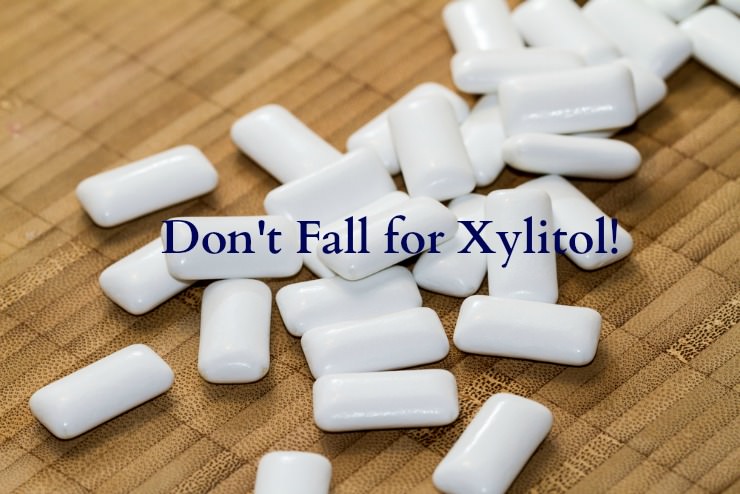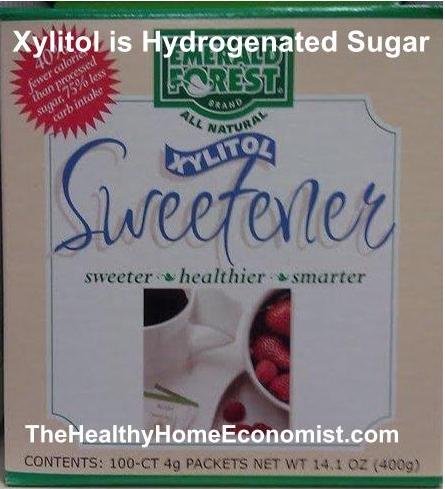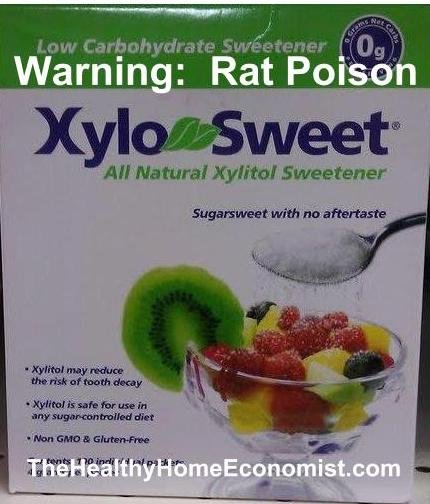
Xylitol is truly the darling of sugar substitutes today. The American Dietetic Association touts its use, with this sugar alcohol sold alone and as a sweetener in a variety of processed foods. Health benefits include a reduced glycemic response compared with sucrose, increased absorption of B vitamins and calcium, and even a reduction in dental caries risk.
Consequently, people with blood sugar issues are flocking to processed foods containing this alternative sweetener as a way to satisfy that sweet tooth without the downside of exacerbating the risk factors for Metabolic Syndrome. This condition is known for the markedly increased likelihood of developing heart disease, stroke, and type 2 diabetes.
Even the healthfood community almost universally considers this sugar alcohol to be a healthy substitute for sugar. A primary reason is that it doesn’t directly contribute toward the growth of intestinal yeasts aka Candida.
Have you noticed that the check out aisles at health food stores are typically loaded with chocolates and other sweets containing at least some xylitol? The truth is that I have yet to talk with any health-conscious person who suggests to me any downside other than the potential for intestinal cramps if you get too much.
Xylitol is Naturally Found in Nature
Xylitol is, after all, a naturally occurring substance. Manufacturers of xylitol market it as derived from xylan. The fibers of many plants contain it, including berries, oats, beets, sugar cane and birch. Sounds pretty harmless at first glance.
The FDA has even granted xylitol GRAS (Generally Recognized As Safe) status. You can’t get any safer than that, right?
 Manufacturing Process
Manufacturing Process
It is true that xylitol is a naturally occurring substance. However, manufactured xylitol is another matter entirely. Food manufacturers produce it using the industrialized process of sugar hydrogenation. In order to hydrogenate anything, a catalyst is needed. In this case, Raney nickel is used which is a powdered nickel-aluminum alloy. (1, 2)
This poses the risk of heavy metal residue and contamination. Nickel, by the way, is a recognized carcinogen and aluminum is associated with the development of dementia. Heavy metals in the body are notoriously difficult to eliminate with frequent use of infrared sauna probably a good idea.
This alternative sweetener doesn’t seem quite so warm and fuzzy anymore, does it?
There is currently no literature on any detrimental health effects of consuming hydrogenated sugar. However, food manufacturers widely used hydrogenated fats for decades before the very damaging effects of cardiovascular health became widely known!
Given the violent industrialized process that is required to produce a hydrogenated sugar like xylitol, it would seem wise to avoid it based on the very poor track record of hydrogenated foods in general.
Most Xylitol Sourced from GMO Corn
While it is true that xylitol can be derived from the xylan of birch trees, xylan is also found in corn cobs. It is much cheaper to use corn instead of birch bark to derive xylitol and so what do you think manufacturers prefer? Corn, of course.
Therefore, unless the label of a xylitol-containing product specifically notes that it is from birch or another nonGMO source, xylitol is very likely from genetically modified corn or possibly GMO sugar beets.
This is the same problem as high fructose corn syrup (HFCS) and white sugar from beets. Food manufacturers rely heavily on these sweeteners in the production of sodas and sports drinks.
You get a dose of GMOs with every sip! More on GMO dangers including sterility and stomach holes at the provided link.
Usage Contributes to Gut Imbalance
The digestive process does not break down sugar alcohols like food. Rather, xylitol arrives intact into the intestines.
At that point, a process called “passive diffusion” takes place. This means that the xylitol draws water into the bowels. Only a partial breakdown is the end result. The unmetabolized portion ferments providing the perfect environment for undesirable bacteria to thrive and grow.
It is true that xylitol itself does not feed candida directly as sugar does. As a result, this artificial sweetener is even promoted as a useful part of the Candida Diet. Unfortunately, the fermentation of undigested xylitol in the gut most definitely can exacerbate yeast problems. Don’t be fooled by this argument!
This is exactly why consuming xylitol can make some folks so gassy and even trigger cramping and diarrhea. Gut pathogens having a heyday in your intestines give off a lot of smelly toxins!
Other Little Known Problems
Xylitol can contribute to acid reflux problems. As a result, those who have issues in this area should avoid it for that reason alone. Chronic acid reflux is a serious problem that can lead to cancer of the esophagus and larynx.
In addition, those who suffer from seizures of any kind should stay away from this alternative sweetener as it can increase the frequency of epileptic attacks.
Two Pieces of Xylitol Gum Can Kill a Rat?
According to unpublished lab tests, approximately 1.65 grams of xylitol kills a 100-gram rat half the time.
Two little pieces of xylitol gum contain about .7 – 1 gram. This is probably enough to meet the definition of rat poison.

Cavity Prevention
Many people are chewing xylitol gum due to compelling scientific evidence for cavity prevention. What about children, however?
Rami Nagel, author of Cure Tooth Decay, doesn’t even recommend xylitol gum for this purpose. His research for any long term safety data turned up the following:
- Epidemiology: No information found
- Teratogenicity: No information found
- Reproductive Effects: No information found
- Mutagenicity: No information found
- Neurotoxicity: No information found
In summary, using this modern substance officially renders you a guinea pig, my friend! It seems that any benefits of cavity prevention are outweighed by the fact that there is no actual safety data backing up its use.
Safe Uses of Xylitol
Given all the problems that consumption of xylitol can trigger, it seems best to bypass the use of this sugar substitute on a regular basis.
Can it ever be helpful? Does it have any benefits whatsoever?
Potentially so. The only time I personally would ever consider using xylitol is to help resolve a childhood ear or sinus infection in order to prevent the use of drug-based antibiotics.
There is evidence that this popular sugar alcohol can indeed help encourage a healthy balance of beneficial bacteria found in the ear canal and sinus cavities. Products like this incorporate xylitol for this purpose.
A therapeutic dose can help resolve infection in these areas quickly with no medication required.
Thus, if you choose to use it, make sure it is sparingly and therapeutically (not as food). Also, make sure it does not come from a GMO source like corn!
References
(1) Xylitol production via catalytic hydrogenation of sugarcane
(2) Catalytic hydrogenation of xylose to xylitol using ruthenium catalyst on NiO modified TiO2 support
(3) Cure Tooth Decay by Rami Nagel
(4) Sugar-Free Blues: Everything You Wanted to Know about Artificial Sweeteners
More Information
Yacon: Healthy Syrup or Healthfood Hype?
Jaggery: India’s Sweet Gift








The internet is flooded with so many articles always claiming that foods that were once considered healthy are really not. One common factor I noticed is that many of these internet articles making these claims do not cite any research, studies, doctors or scientists. Take this article on xylitol for example. You will notice that the article has not author, and there are no studies or research cited. I’ve researched many printed studies about the benefits of foods such as raw apple cider vinegar, bovine colostrum, and olive leaf extract. I make sure that those printed materials have cited sources. I’ve been taking those foods in excess for years now. They have truly helped me with my ailments. I also know that people can lie and data can be manipulated, but the only sources I seem to trust are sources found in printed material published by doctors and scientists.
That’s exactly the point as pointed out in the article … there is ZERO safety data on xylitol. Its health effects and safety on humans have not been researched.
You can get vanilla or caramel flavoured stevia made by Nirvana Organics. I put two to three drops into my coffee and I love it. There is no unpleasant after taste at all.
you might find Monk fruit liquid ok, the taste is way better than stevia which i also hate. I eat low carb as a type 1 diabetic. Mostly have just stopped using artificial sweeteners and certainly don’t use any real sugars but if I really want a little something sweet I will use monk fruit mixed with a bit of stevia. I’ve actually come to discover that xylitol made me itchy on my arms, prickling itchy sensation. which brought me to search info on it. Unfortunately there are very few good Low carb sweeteners. My realisation is that you mostly need to stop eating sweet anything if you are a diabetic. If you want normal blood sugar. Oh an that goes for carbs as well…they’re the same thing in the end.
Do you have any references to back up the claim that it provides “the perfect environment for undesirable bacteria to thrive and grow.”? Yes, like fermentable fiber, which is a good thing, it makes it to the colon to be fermented there, but I’ve seen no evidence that this is a bad thing. One study shows it promotes butyrate formation, which is actually a good thing.
So as a person that’s been recently diagnosed with Type 2 Diabetes I like Xylitol because it’s got no weird after flavor like Stevia. I mix it with Coconut Sugar to add that bit of vanilla after flavor I love and then mix that mix with Clouds Coconut Creamer and it’s divine. So is there a alcohol sugar that’s safer than Xylitol that you would recommend? I had a friend blow up at me yesterday at Philz’s Coffee when I told her, happily, that I was using Xylitol to sweeten my coffee and she went on and on about what you described in your article. So I really need to be pointed in the right direction. I hate Stevia so if that’s all you can recommend I guess I’ll stick with the my little mixture.. thank you!
Thank you for your studies and to put it out there. I have had a slight return of acid reflux after doing a bit of xylitol that came with a neti pot a friend suggested i get. Acid reflux subsided for about 2 weeks because ive been consuming alkaline producing veggie diet and it took a while for that to go away.
im glad to hear it helps w sinuses, but ive stayed away from corn as part of my diet so doubt if I will be putting anymore in my head. Makes you wonder what happens after. I got a bit of acid reflux I believ just from the little bit I put in with water.
im not gonna chance it anymore and im sending my friend your article. Thanks again.
I dont think hydrogenated anything is so good for a body. Not a bet I wish to gamble on either. Even though you can hydrogenated without a metal catalyst. I think hydrogenated fats prove the point…they are worse than regular fats, including animal fats..like butter, of which im not doing these days, and healthier because if it. I put myself on this diet, cuz I asked my diabetic friend who is now on 15 medications and has high blood pressure, heart issues, gout and neuropathy through the doctors orders. Meanwhile I started, cuz it aint right to ask someone to do something you wont do yourself. I asked him to do ontermittent fastinf along with low carb, high fat diet. He doubted and is now in hospital and they talking heart transplant and im 25 lbs lighter after 2.5 months. I feel great
Since I don’t own any stock in Xylitol, it doesn’t matter to me that anyone would argue against not using it. I just have a hard time letting any argument based on logical fallacy go by unchallenged. There’s at least three here.
The fact that an alloy containing a heavy metal is used as a catalyst (and not an ingredient) to hydrogenate Xylitol, increases the odds that residue might contaminate the end product, thus passing along the detrimental effects associated with heavy metals. This is not only a reach, it’s a “Fallacy of Composition,” which is summarized: A is part of B. A has property X. Therefore, B has property X.
A similar and weaker argument is: Xylose can be harvested from GMO sources. GMO’s are bad (apparently so indisputable it needs no further comment, I guess)… Therefore, Xylitol is bad.
Finally, is the very popular “Argument from Ignorance,” the fallacy simply stated for example: Safety data on Xylitol was not found, Therefore, Xylitol is anything but safe.
I’ve been taking xylitol for 12 years and my sperm is still good, 3 kids and they are normal. Havent seen a dentist for 10 years until 2 years ago and they couldn’t find plaque, i brush my teeth once every other day.. and I get my blood work done once a year..all is normal. I eat xylitol like sugar and candy at least 5 times a day.. but you don’t have to take my word for it.
A 100g rat eating 1.6g of xylitol is the equivalent of a human eating 2.5 POUNDS of xylitol—OF COURSE that can kill you.
Has anyone tried eating 2.5 pounds of salt??? That will kill a human 100 out of 100 times. Consuming ANY substance to that degree will do serious if not fatal harm.
I have no stance on xylitol, I’m still learning about it, but the reasons put forth in this article on why it should not be used don’t add up.
If xylitol as rat poison is not compelling for you, how about the fact that xylitol has absolutely no safety data on it:
Epidemiology: No information found
Teratogenicity: No information found
Reproductive Effects: No information found
Mutagenicity: No information found
Neurotoxicity: No information found
I need to know if Xylitol is poisonous to monkeys?